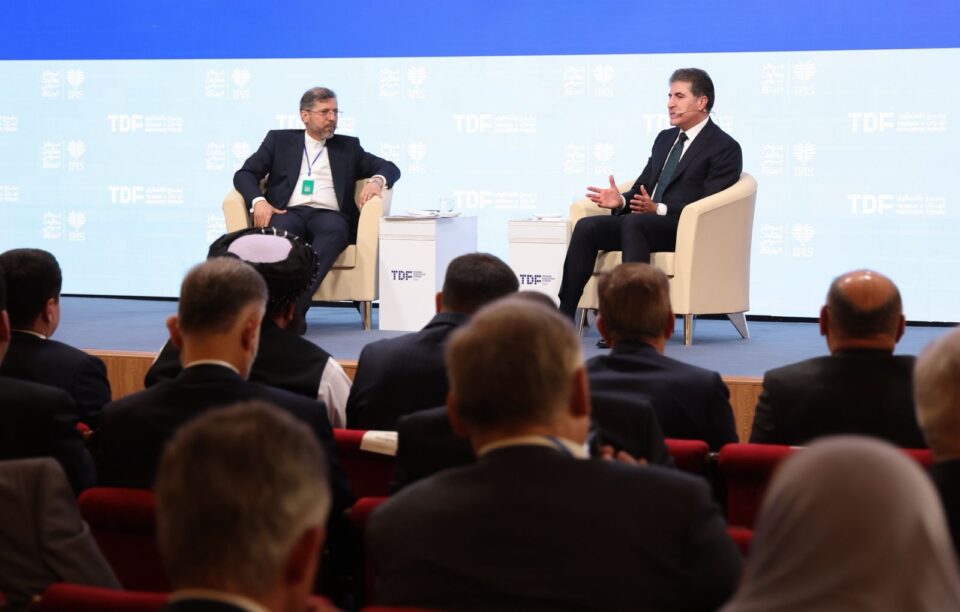Kurdistan Region President Nechirvan Barzani’s participation in the Tehran Dialogue Forum last week, highlighted the complex web of regional relationships that define contemporary Middle Eastern geopolitics. Speaking at the official invitation of Iran’s Ministry of Foreign Affairs, Barzani addressed critical issues ranging from Iraq’s federal structure to security cooperation, while emphasizing the Kurdistan Region’s role as a bridge between Iraq and Iran.
The forum, which included Iranian President Masoud Pezeshkian among its participants, provided a platform for Barzani to articulate his vision for Iraq’s future and the Kurdistan Region’s place within it. His remarks, delivered in both Kurdish and Persian, underscored the multilingual diplomacy that characterizes regional politics and his personal commitment to strengthening bilateral ties.
Iraq’s Federal Challenge: From Constitution to Implementation
Barzani’s most pointed criticism centered on Baghdad’s failure to implement Iraq’s federal system as outlined in the constitution approved by 80% of Iraqi voters. “Unfortunately, I must say we have not yet reached that point. Iraq is still very far from being truly federal,” he stated, reflecting long-standing tensions between the Kurdistan Regional Government and the central government in Baghdad.
The Kurdistan Region President argued that true political stability in Iraq hinges on resolving the federalism question. He criticized Baghdad’s approach, noting that “the way Baghdad deals with the Kurdistan Region is in no way based on federalism.” This candid assessment reveals ongoing frustrations despite Iraq’s relative stability compared to previous years, which Barzani acknowledged by noting that “the biggest issue in Baghdad now might be traffic jams.”
Nechirvan Barzani’s call for honest dialogue between Erbil and Baghdad reflects a pragmatic approach to governance challenges. He emphasized that resolving federal arrangements would enable Iraq to play a more influential regional role, leveraging the country’s natural and human resources. This perspective positions the Kurdistan Region not as a separatist entity but as an integral part of a properly functioning federal Iraq.
Strategic Partnership: Security Cooperation and Economic Integration
The discussion revealed significant progress in Iran-Kurdistan Region relations, particularly in security cooperation. Barzani announced the establishment of a trilateral mechanism involving Baghdad, Erbil, and Tehran to address security concerns, declaring that “we will not allow the Kurdistan Region to pose a threat to its neighbors, especially to the Islamic Republic.”
This security framework represents a notable diplomatic achievement, addressing Iran’s long-standing concerns about Kurdish militant groups operating from Iraqi territory. Barzani’s clear commitment that Kurdistan Region territory “has not and will not be a source of danger to the Islamic Republic of Iran” signals a mature approach to regional security challenges.
Economic ties between Iran and the Kurdistan Region have flourished, with approximately 60% of Iran-Iraq trade flowing through Kurdish territory. The meeting between Kurdistan Region governors and their counterparts from Iran’s Eastern Kurdistan provinces demonstrates the practical implementation of enhanced cooperation. This economic integration provides a foundation for broader political cooperation and regional stability.
Regarding the PKK issue, Barzani positioned the Kurdistan Region as a potential facilitator in Turkey’s peace process, stating that “this issue cannot be resolved through war and bloodshed.” His offer of support for resolving the PKK question reflects the Kurdistan Region’s evolving role as a mediator in regional conflicts rather than merely a participant.
President Pezeshkian’s visit to both Baghdad and Erbil marked what Barzani described as a “turning point” in relations. The Iranian president’s fluency in Kurdish, demonstrated during his Erbil visit, symbolized the cultural connections that underpin political cooperation. These linguistic and cultural ties, combined with historical support during crises like the Halabja tragedy and the fight against ISIS, create a foundation for sustained partnership.
Barzani’s emotional reference to Iran as “home” and his mention of visiting Azimiyeh in Karaj where Iraqi Kurdish refugees once found shelter, illustrates how personal and historical memories shape contemporary diplomatic relationships. This human dimension of diplomacy, often overlooked in political analysis, provides crucial context for understanding the depth of Iran-Kurdistan Region cooperation.
The Tehran forum appearance demonstrates Barzani’s sophisticated diplomatic approach, balancing criticism of Baghdad’s federal implementation with constructive engagement on regional security and economic cooperation, positioning the Kurdistan Region as both a loyal part of Iraq and a reliable partner for Iran.
By Jawad Qadir

